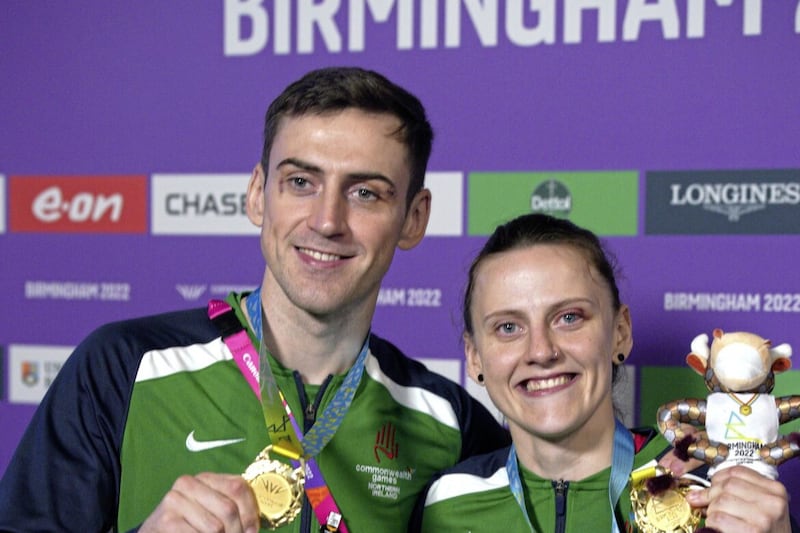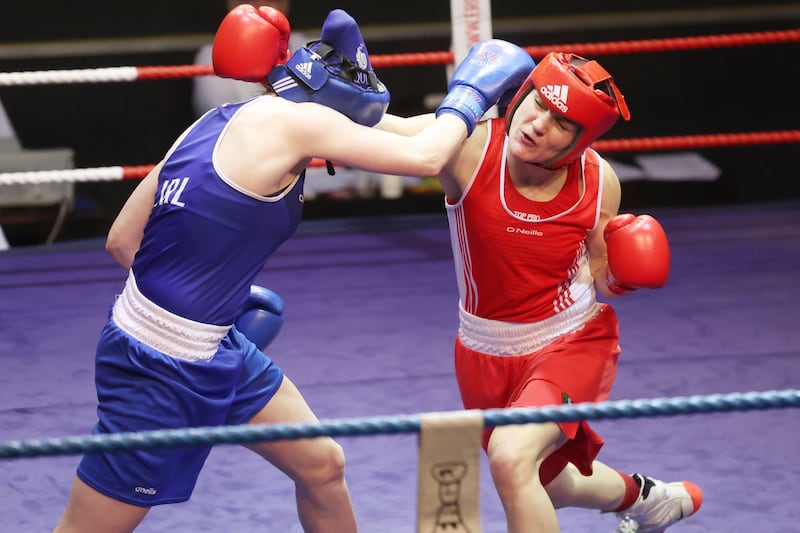THERE were aspects of the past four months that Michaela Walsh “enjoyed in a way”, but boxing is much more than just business for the west Belfast woman.
Last week, alongside brother Aidan, she joined Irish team-mates Brendan Irvine, Kurt Walker and Carly McNaul for their first collective post-lockdown strength and conditioning sessions at the Ulster University’s Jordanstown base.
Rather than calling athletes from across the country to the National Sports Campus in Abbotstown, the Irish Athletic Boxing Association has instead opted for a regional strategy in the months ahead – with boxers being based in Belfast, Dublin and Offaly.
Walsh couldn’t be happier to remain close to home, or to be back doing what she loves. The logistics of actual boxing training sessions at Jordanstown were still being thrashed out last week, with the plan to resume under the watchful eye of coaches John Conlan and Damien Kennedy in the coming days.
“I love being able to train up in Jordanstown. It was myself and Aidan, Brendy, Kurt, Carly, I think [Dundalk lightweight] Amy Broadhurst might be coming up. It was just S&C first to get into swing of things, and it was good to get back.
“The boxing gym’s big enough so you’re not on top of each other, you would have your own station, but it’ll still be a good while before we’re able to spar or anything. It feels like a lifetime since my last spar before the qualifiers…”
Ah, the European Olympic qualifier. Speaking of things that feel like a lifetime ago.
It was mid-March when the rug was pulled from under the hundreds of athletes who had carefully and strategically plotted their way to that point, determined to seal their spot at Tokyo 2020.
Some, like Irvine, grabbed their chance to secure qualification before the competition was cancelled from St Patrick’s Day. For most, though, it is now a waiting game until that qualifier resumes, most likely in February.
Walsh, alongside several of her team-mates, had been due to fight the day after the plug was finally pulled. Had she won her last 16 clash with French feather Mona Mestiaen, the 27-year-old would have needed just one more win to qualify.
The fall-out, and subsequent Olympic postponement until next summer, was tough to take.
“The whole thing was mad.
“Even before it was officially cancelled, the guy driving our bus had told us it was being called off, that we were going home that night. I was weighing in the next day so went back to the hotel where we were told it was over, but we had to keep it quiet because Kurt and Brendy were fighting that night in the last session.
“Going home after the qualifier was cancelled, for me it felt like I’d been beat. Even though I didn’t fight, I felt like I’d been beat.
“Everything, all our training was geared towards the qualifiers. I was two fights away from qualifying for the Olympics. There was talk of them being rescheduled for three weeks later, I thought I’d have to go back and reset, but eventually it was announced that the Olympics had been postponed until next year.
“The first week after that was confirmed I felt very down. My life is boxing. I remember being asked before we went to London would you do if the Olympics were cancelled, but I genuinely wasn’t even thinking that way. Not at all.
“Athletes are only human, we have emotions as well, so I was a bit down but you have to get yourself out of it. There’s nothing you can do about it, every athlete’s in the same boat. There’s worse things in life, people have died because of the virus, they’re getting sick.
“Boxing is only a sport, and I have to try and take the positives. I’ve an extra year to work on things, because you don’t really get the time to stop and think ‘I need to be doing more of this’, or having more time to look at people at your weight and work out how to beat them.
“You’ve an extra year to work on what you need to.”
There has been talk of a possible tournament in Germany towards the end of the year, but that is dependent on so many other factors as the Covid-19 situation continues too evolve.
It would be great to get some international competition before the qualifier eventually resumes, Walsh acknowledges, but it is out of her hands.
The enforced break has given her a renewed sense of perspective, and served as a reminder of what it is like to live without boxing.
“You learn to be normal again.
“You’re just a normal person who does a mad sport, but you’re just so flat out all the time that you never have time to stop. Everybody just keeps on going, stays on the treadmill, so for someone to hit stop and all of a sudden you’re doing nothing but relaxing and recharging the batteries… it’s strange.
“But in a way I enjoyed it, getting to spend time with my family and my partner - I’ve hardly had that since I started boxing. The most you would be getting is a week off. You realise there’s life after boxing as well and you need to know what way to deal with that.
“Looking after your mental health and keeping your head right is so important. I enjoyed the break in a way, but I’m glad to be back.
“Nobody knows what’s going to happen with the Olympics but at the minute it’s still there, my dream’s still alive. There’s still something to work towards.”







